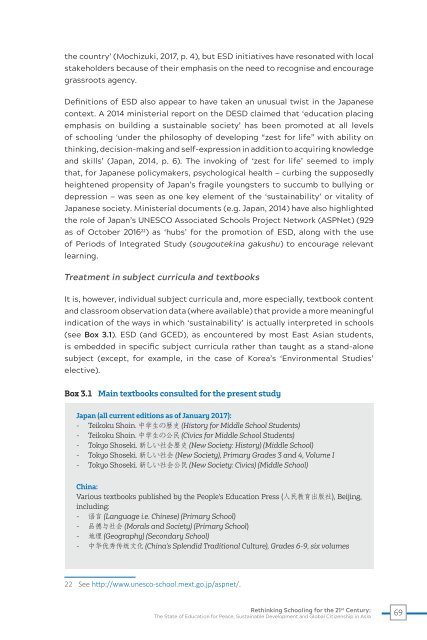Rethinking Schooling for the 21st Century
UNESCO MGIEP officially launched 'Rethinking Schooling for the 21st Century: The State of Education, Peace and Sustainable Development and Global Citizenship' in 2017 at the UNESCO General Conference. This study analyses how far the ideals of SDG 4.7 are embodied in policies and curricula across 22 Asian countries and establishes benchmarks against which future progress can be assessed. It also argues forcefully that we must redefine the purposes of schooling, addressing the fundamental challenges to efforts to promote peace, sustainability and global citizenship through education.
UNESCO MGIEP officially launched 'Rethinking Schooling for the 21st Century: The State of Education, Peace and Sustainable Development and Global Citizenship' in 2017 at the UNESCO General Conference. This study analyses how far the ideals of SDG 4.7 are embodied in policies and curricula across 22 Asian countries and establishes benchmarks against which future progress can be assessed. It also argues forcefully that we must redefine the purposes of schooling, addressing the fundamental challenges to efforts to promote peace, sustainability and global citizenship through education.
You also want an ePaper? Increase the reach of your titles
YUMPU automatically turns print PDFs into web optimized ePapers that Google loves.
<strong>the</strong> country’ (Mochizuki, 2017, p. 4), but ESD initiatives have resonated with local<br />
stakeholders because of <strong>the</strong>ir emphasis on <strong>the</strong> need to recognise and encourage<br />
grassroots agency.<br />
Definitions of ESD also appear to have taken an unusual twist in <strong>the</strong> Japanese<br />
context. A 2014 ministerial report on <strong>the</strong> DESD claimed that ‘education placing<br />
emphasis on building a sustainable society’ has been promoted at all levels<br />
of schooling ‘under <strong>the</strong> philosophy of developing “zest <strong>for</strong> life” with ability on<br />
thinking, decision-making and self-expression in addition to acquiring knowledge<br />
and skills’ (Japan, 2014, p. 6). The invoking of ‘zest <strong>for</strong> life’ seemed to imply<br />
that, <strong>for</strong> Japanese policymakers, psychological health — curbing <strong>the</strong> supposedly<br />
heightened propensity of Japan’s fragile youngsters to succumb to bullying or<br />
depression — was seen as one key element of <strong>the</strong> ‘sustainability’ or vitality of<br />
Japanese society. Ministerial documents (e.g. Japan, 2014) have also highlighted<br />
<strong>the</strong> role of Japan’s UNESCO Associated Schools Project Network (ASPNet) (929<br />
as of October 2016 22 ) as ‘hubs’ <strong>for</strong> <strong>the</strong> promotion of ESD, along with <strong>the</strong> use<br />
of Periods of Integrated Study (sougoutekina gakushu) to encourage relevant<br />
learning.<br />
Treatment in subject curricula and textbooks<br />
It is, however, individual subject curricula and, more especially, textbook content<br />
and classroom observation data (where available) that provide a more meaningful<br />
indication of <strong>the</strong> ways in which ‘sustainability’ is actually interpreted in schools<br />
(see Box 3.1). ESD (and GCED), as encountered by most East Asian students,<br />
is embedded in specific subject curricula ra<strong>the</strong>r than taught as a stand-alone<br />
subject (except, <strong>for</strong> example, in <strong>the</strong> case of Korea’s ‘Environmental Studies’<br />
elective).<br />
Box 3.1 Main textbooks consulted <strong>for</strong> <strong>the</strong> present study<br />
Japan (all current editions as of January 2017):<br />
- Teikoku Shoin. 中 学 生 の 歴 史 (History <strong>for</strong> Middle School Students)<br />
- Teikoku Shoin. 中 学 生 の 公 民 (Civics <strong>for</strong> Middle School Students)<br />
- Tokyo Shoseki. 新 しい 社 会 歴 史 (New Society: History) (Middle School)<br />
- Tokyo Shoseki. 新 しい 社 会 (New Society), Primary Grades 3 and 4, Volume I<br />
- Tokyo Shoseki. 新 しい 社 会 公 民 (New Society: Civics) (Middle School)<br />
China:<br />
Various textbooks published by <strong>the</strong> People’s Education Press ( 人 民 教 育 出 版 社 ), Beijing,<br />
including:<br />
- 语 言 (Language i.e. Chinese) (Primary School)<br />
- 品 德 与 社 会 (Morals and Society) (Primary School)<br />
- 地 理 (Geography) (Secondary School)<br />
- 中 华 优 秀 传 统 文 化 (China’s Splendid Traditional Culture), Grades 6-9, six volumes<br />
22 See http://www.unesco-school.mext.go.jp/aspnet/.<br />
<strong>Rethinking</strong> <strong>Schooling</strong> <strong>for</strong> <strong>the</strong> 21 st <strong>Century</strong>:<br />
The State of Education <strong>for</strong> Peace, Sustainable Development and Global Citizenship in Asia<br />
69

















